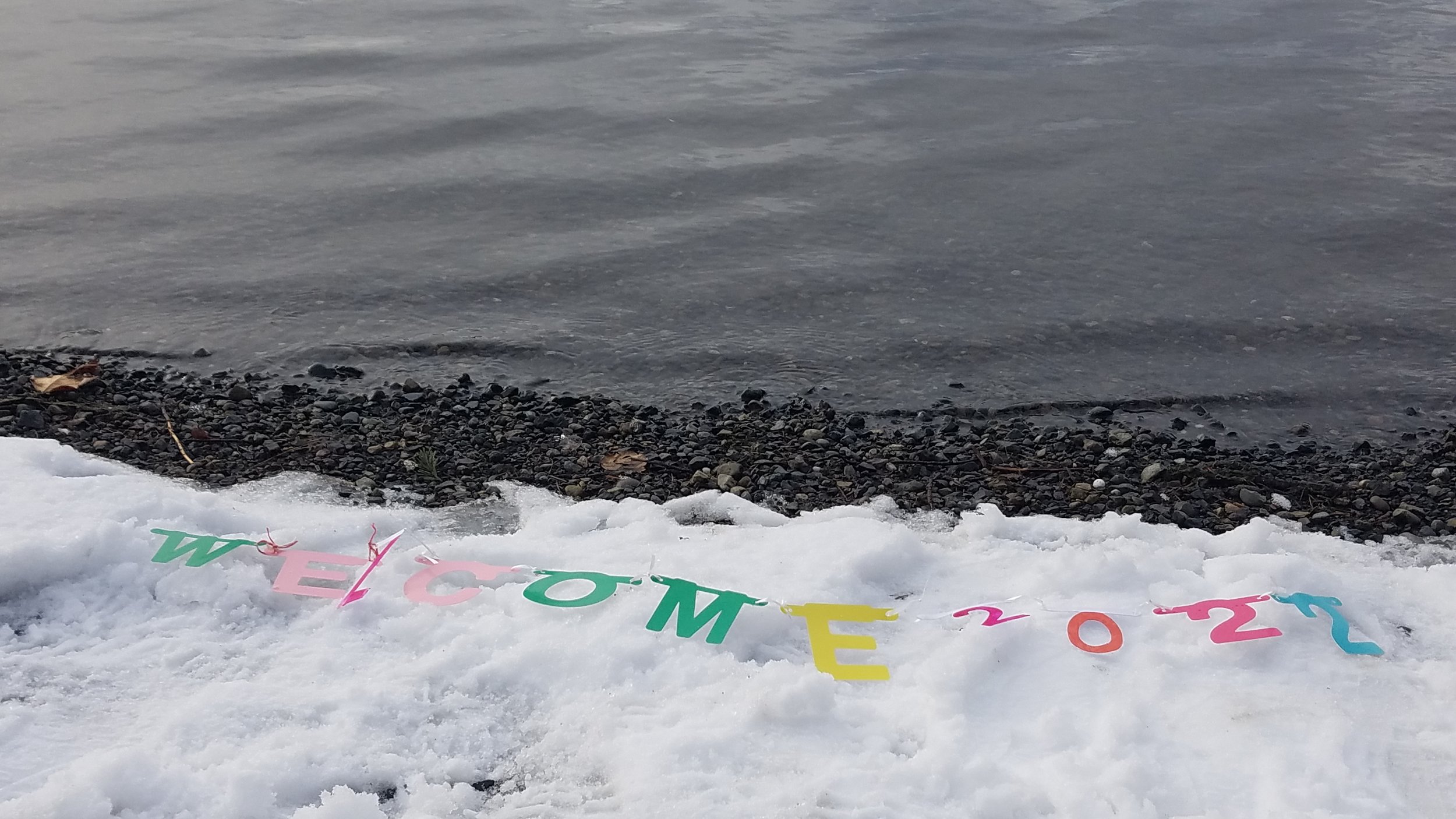New Year got off to a brisk start with a very short barefoot walk across the snow and a very quick dip-swim in Ward Lake. The air was around 36 degrees F and the water 42 degrees F. While these temps might cause you to shiver, they are more “do-able”—even enjoyable—if you’ve been swimming every week or so year round. But believe me, there is no shortage of shivering and goosebumps among the swimmers!
I started lake swimming when I moved to Washington State 15 years ago, then made it a summer habit 10 years ago, and a year-round habit 3 years ago. In that time, “wild swimming” has become an international craze, especially in the northern climes of the globe. The Outdoor Swimming Society is responsible for much of the popularity of this pastime, with an inspiring and useful website as well as a Facebook page with nearly 88,000 followers. There are wild swimming groups near me—Olympia Wild Swimming and Western Washington Open Water Swimmers among others—with regular swims in Puget Sound and local lakes.
We all seem to agree that full immersion in really cold water is good for our health, well-being, and sense of camaraderie, especially during the pandemic. It’s easy to stay at least 6 feet apart from fellow swimmers—though masks really don’t work. For some, neoprene covers every inch of their body except the face. I don’t think the CDC has issued any guidance on the efficacy of wet masks. Yet.
For the past several years, I’ve also been talking about writing a book on lake swimming in Washington—a combination of natural history and personal narrative. But, surprise! There are many wild swimmers out there with stories to tell as well. In fact, there are so many books on wild swimming that an unofficial genre has emerged: the swimoir. Here’s a list of a few new titles.
Just some of the wonderful already published books—non-fiction, guides, and “swimoirs” on wild swimming. (Photo by M.M Ruth)
As a reader, this is fantastic! As a writer, this is a problem. It makes me wonder what there is left to say. It makes me doubt the world (or the world of niche of readers) needs another book on wild swimming. It makes me question my purpose for writing such book. It adds more pressure to write something that justifies the resources and risks associated with publishing, marketing, and selling it. These questions should always be asked, over and over, before and during a writing project.
One of the main goals in mind for my previous books—A Sideways Look at Clouds and Rare Bird—was to connect my reader more deeply to the natural world and to draw attention to overlooked natural wonders (clouds and an endangered seabird known as the marbled murrelet, and to inspire my readers to learn about and protect some part of the natural world that spoke to them. The goal for a book on lake swimming in Washington is essentially the same: to connect people to the lakes and rivers we typically just walk around, hike to, picnic near, or cross over but never dip a toe in. Seems like I should have finished that book by now, right? (The answer is yes). But, when when I wrote my books on clouds and the marbled murrelet, I didn’t have to reset or re-evaluate every six months when a new cloud book or murrelet book was published. Because none were published. Wild swimming is a different beast. And, the mightiest of beasts so far is the extraordinary lovely little 2020 chapbook by Alexis Wolf called Body of Water.
Body of Water by Alexis Wolf finds its perfect form as a chapbook—”smaller and simpler by design.”
A chapbook is a small paperback book or pamphlet—a perfect format for poems or short essays. The essays in Body of Water are as pure, refreshing, and brief as at the perfect cold-water swim. This chapbook, published in 2020 by Two Plums Press in Portland, is just 81 pages long—but several fewer pages of actual writing thanks to front matter and actual blank pages. Such restraint! Such a suitable format for Wolf’s spare, precise, evocative writing about her experiences swimming in lakes and rivers near her former home in Seattle and new home in England. I do not know if Alexis Wolf aimed to write a 200-page book and then shrunk it down or preferred not to publish her essays in literary magazines or as blogs. But I sense that Body of Water is exactly as long as she wanted it to be—not one word more, not one word less. Wolf’s essays are brief and, like a real-life swim, the effects continue to ripple long after your immersion in and emergence from each.
And now, a new year to navigate the ripples and waves—literal and figurative—in a changing world where the need for true words and meaningful actions has never been greater. Onward!
Body of Water is available through Two Plums Press. Learn more about Alexis Wolf on her website.





